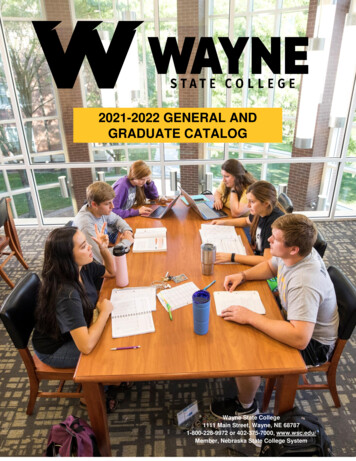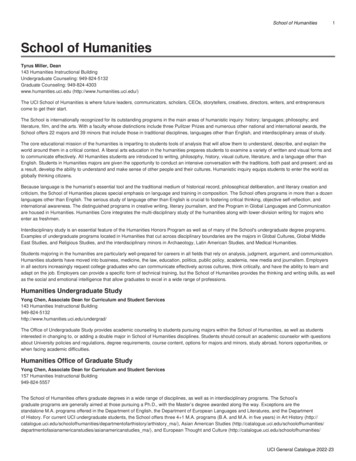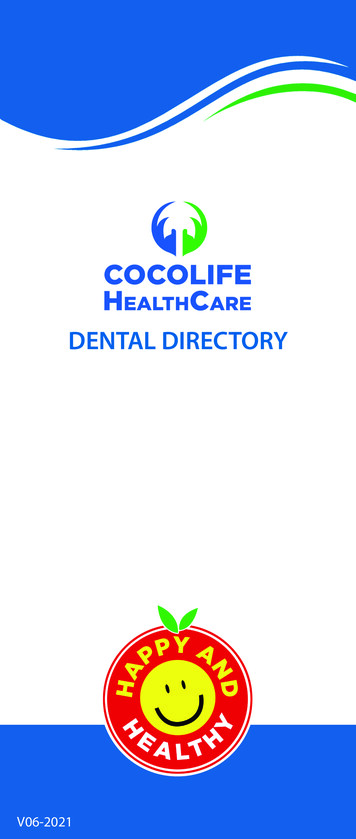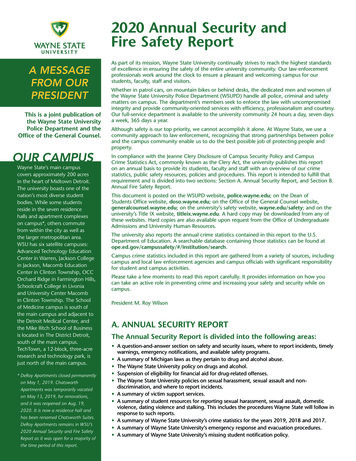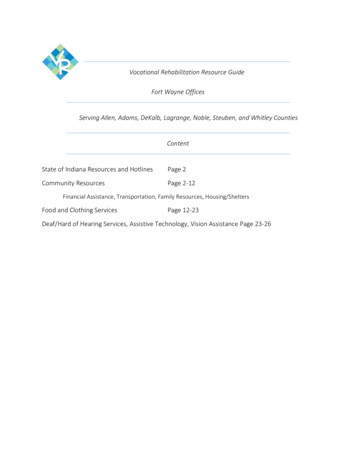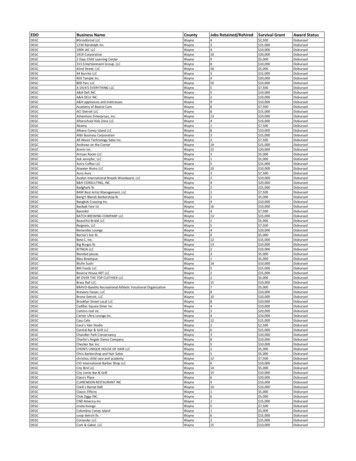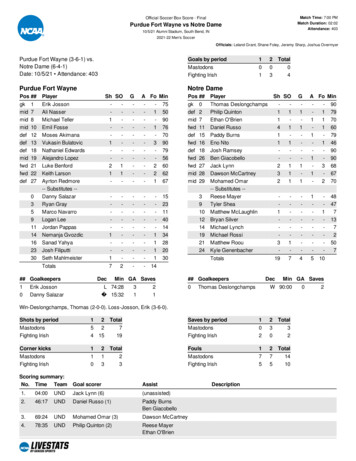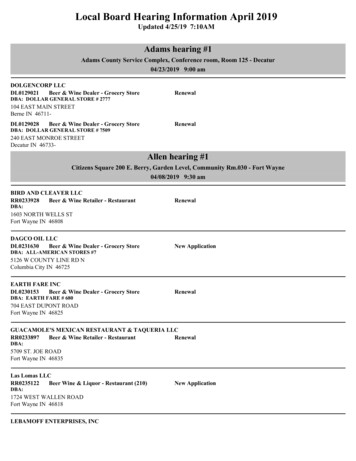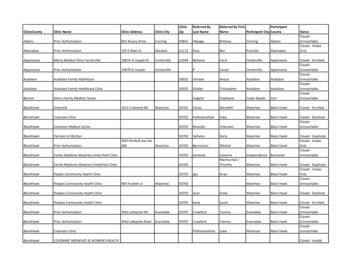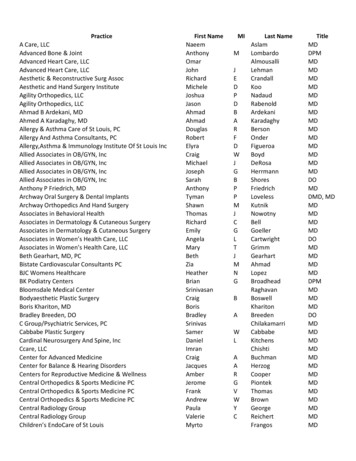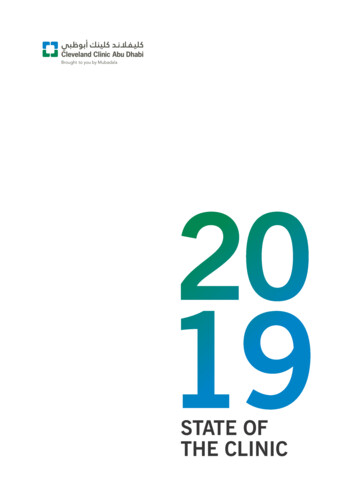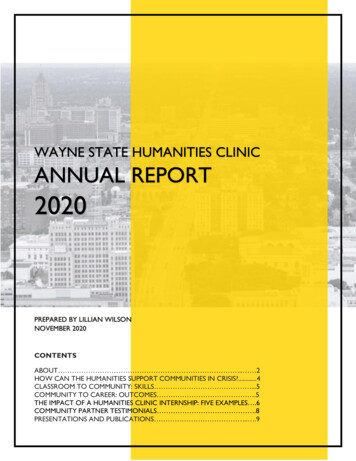
Transcription
WAYNE STATE HUMANITIES CLINICANNUAL REPORT2020PREPARED BY LILLIAN WILSONNOVEMBER 2020CONTENTSABOUT . 2HOW CAN THE HUMANITIES SUPPORT COMMUNITIES IN CRISIS?.4CLASSROOM TO COMMUNITY: SKILLS .5COMMUNITY TO CAREER: OUTCOMES .5THE IMPACT OF A HUMANITIES CLINIC INTERNSHIP: FIVE EXAMPLES .6COMMUNITY PARTNER TESTIMONIALS .8PRESENTATIONS AND PUBLICATIONS . .9
ABOUTThe Humanities Clinic is an innovative internship program that enhances graduate teaching inthe humanities and humanistic social sciences at Wayne State University by hiring graduatestudents to work as paid, semester-long interns with Detroit non-profits and smallbusinesses. The mission of the Humanities Clinic is to bring humanities and social scienceexpertise to communities throughout Detroit and to prepare graduate students for meaningfuland diverse careers while supporting local businesses and non-profits.The Clinic is based in the Department of History and hires graduate students from allhumanities and social science departments. Professor Elizabeth Faue the Clinic director, andhistory PhD candidate Lillian Wilson is the Clinic coordinator.OUR SPONSORSAmerican Historical Association Career Diversity InitiativeWayne State Graduate SchoolCollege of Liberal Arts and SciencesWayne State Department of HistoryThe Office of the Vice President for ResearchThe Office of the ProvostPrivate Donors2020 COMMUNITY PARTNERSHenry Ford Health SystemWayne State School of MedicineKarmanos Cancer InstituteLegal Advocacy for People with Cancer LawClinic (LAPC), Wayne State Law SchoolAsylum and Immigration Law Clinic, WayneState Law SchoolDetroit Public Schools FoundationFood Rescue USDetroit Artists MarketWayne County Council for the ArtsCLEARCorp Detroit/Southeast MichiganHealth AssociationInsideOut Literary Arts ProjectStand with TransWayne State College of NursingWayne State Department ofCommunicationsWayne State Department of SociologyWayne State School of Social WorkWayne State Campus Health CenterOurHealth Media NetworkUrban Aging NewsMercy Education ProjectScarab ClubItalian Film Festival and MuseumWakeUPP DetroitA Host of PeopleEldercare & Caregiver Solutions2
2020 INTERNSKarine Ibrahim, Political Science: WayneCounty Council for the Arts; River RaisinInstituteJames McQuaid, History: Institute ofGerontology and Wayne State School of SocialWorkAlexandra Penn, History: Wayne CountyCouncil for the Arts and Humanities; DetroitArtist MarketAeYanna Yett, Social Work: Institute ofGerontology and Wayne State School of SocialWorkAndrés Romero, Anthropology: WayneCounty Council for the Arts; Henry FordHealth SystemSandra Rodriguez-Bontemps, Classicaland Modern Languages: Detroit Water Stories;Our Health Media NetworkMaria Clara Martucci, Communications:Henry Ford Health SystemSarah Chapman, English: Detroit WaterStories; “The Ferrania Film Museum” ResearchProjectHaley Scott, Anthropology, Social Work:Henry Ford Health SystemLindsay Toman, Sociology: Stand with TransAlex Fleet, History: Henry Ford HealthSystem; Detroit Public Schools FoundationDorothy Feltner, Communications: WayneState College of Nursing; Urban Aging NewsFatima Al-Brehi, Communications: LegalAdvocacy for People with Cancer ClinicKathryn Gstalder, Library Science: WayneState College of Nursing; WakeUPP DetroitColleen Linn, Anthropology: Legal Advocacyfor People with Cancer ClinicAngela Kemp, Urban Planning: Food RescueUS-DetroitAmber Harrison, Public History, Library &Information Science: Detroit HistoricalMuseum; Mercy Education ProjectAimee Schulman, History: InsideOut LiteraryArts Project; The Scarab ClubAmanda Horn, Sociology: CLEARCorpDetroit and the Southeast Michigan HealthAssociationKatie Parks, History: Karmanos CancerInstituteSydney Santoviz, Industrial OrganizationalPsychology: Karmanos Cancer Institute;Eldercare & Caregiver SolutionsDovie Jenkins, Philosophy: Department ofCommunication “Racism and Resilience ofPandemic Proportions: DocumentingAwareness, Effects, and Reactions to Online andOffline Harassment During the COVID-19Outbreak” Research Project; A Host of PeopleTodd Hartley, Anthropology, Social Work:Karmanos Cancer InstituteChristina Carney, Sociology: KarmanosCancer Institute; Asylum and Immigration LawClinicMelissa McCabee, Industrial OrganizationalPsychology: Wayne State Campus HealthCenter; Department of Sociology “Work,Family, Social Well-being, and Relationshipsamong Dual-Income Couples During COVID19” Research ProjectKristanti Penrose, Political Science: Asylumand Immigration Law Clinic; Detroit HistoricalMuseum3
HOW CAN THE HUMANITIES SUPPORT COMMUNITIES IN CRISIS?This year, in response to COVID-19, the Wayne State Humanities Clinic deepened itscommitment to Detroit communities. We hired 26 interns—double the number we hired in2019—increased our number of community partnerships, and expanded from a summer-only,to a year-round internship program. In an effort to support healthcare workers and researchersduring the pandemic, we also initiated partnerships with 10 hospitals and health-focusedbusinesses and non-profits including Henry Ford Health System, Karmanos Cancer Institute, theSoutheast Michigan Health Association, the Wayne State School of Medicine, the Wayne StateCollege of Nursing, and the Wayne Law School Legal Advocacy for People with Cancer Clinic.The Humanities Clinic also strengthened its partnerships with local art, education, and culturalorganizations and helped them adapt to new challenges brought on by the pandemic. Internsapplied skills like compiling and analyzing data, implementing community outreach and educationprograms, publishing articles, and managing social media and web content for our communitypartners. Through this work, the Humanities Clinic has demonstrated how the humanities andsocial sciences are central to solving widespread problems from the pandemic to racial injusticeto the economic crisis.In addition to supporting Detroit communities, the Clinic also has had a measurable impact onWayne State graduate students. In July, the Humanities Clinic partnered with the NationalHumanities Alliance to assess the impact of Humanities Clinic internships on job preparednessand community engagement among interns. The survey concluded that most Humanities Clinicinterns feel better prepared to pursue careers within and beyond the academy and feel moreconnected to their communities after completing a Humanities Clinic internship.The recent growth and success of the Humanities Clinic would not be possible without supportfrom our sponsors including the American Historical Association Career Diversity Initiative, theWayne State University Graduate School, College of Liberal Arts and Sciences, Department ofHistory, Office of the Vice President for Research, the Office of the Provost, and privatedonors. We are grateful to our sponsors, as well as our community partners and Wayne Statefaculty who have remained committed to the Clinic’s mission of bringing humanities expertiseto Detroit communities, especially during these trying times.Professor Elizabeth FaueDirectorLillian WilsonCoordinator4
CLASSROOM TO COMMUNITY: SKILLSThe 2020 Humanities Clinic employed 26 interns from 14 academic departments to work with25 community partners, including 10 healthcare organizations and businesses. These are the topskills that community partners requested in 2020:compiling datadata analysisproject developmentsocial media/web developmentcommunity outreachcopy editingarchival researchCOMMUNITY TO CAREER: OUTCOMESThis year, the Humanities Clinic partnered with the National Humanities Alliance to design andimplement a survey to measure the impact of Humanities Clinic internships on graduatestudents; of the interns surveyed:95% feel more connected to their community85% feel better prepared for the non-academic job market85% better understand how they can apply their academic training to a range of jobs76% are more likely to consider careers other than tenure-track teaching72% feel better prepared for the academic job market.Graduate students also gave the following feedback on their Humanities Clinic internships:“I understand how an education in the humanities can be put to use in the community. Prior tothis internship I viewed my skills as purely academic.”“The clinic gave me more confidence in my ability to adapt my work to a wide variety ofsettings.”“I found the internship to be a cross-disciplinary experience, giving me the opportunity to workwith groups of people who I would likely not have encountered in my academic program or inother internships.”“I was offered the opportunity to do work outside of academia, yet incorporate my knowledgein qualitative research methodologies to help create change in the healthcare system. Thisapplied focus helped me consider my potential outside of academia and how I might be able toutilize my skills to work directly with(in) large systems.”5
THE IMPACT OF A HUMANITIES CLINIC INTERNSHIP: FIVE EXAMPLESIn 2020, Humanities Clinic Interns collaborated with one another and our community partnersto address challenges brought on by COVID-19. Five examples of these collaborations arehighlighted below.PROFESSIONALSKILLS GAINEDHistorical analysis,historical documentationand digitization, dataanalysis, communityoutreach, curriculumdesignACADEMICDISCIPLINESREPRESENTED History Communications Anthropology Social WorkOral history, datacollection and analysis,community outreach,foreign language skills HistoryAnthropologySocial WorkPsychologyOral history, datacollection and analysis,historical documentationand digitization,community outreach,media development,foreign language skills EnglishCommunicationsClassical andModern LanguagesCOMMUNITYPARTNERPROJECTOUTCOMES/ IMPACTHenry Ford HealthSystemInterns work with doctorsto create educationalmaterials and assessmentson disease (especiallyCOVID-19) preventionand health disparities forlow-income and other atrisk populations in Detroit.One of the country’s largestmedical groups with sixregional hospitals, HFHSemploys 30,000 metroDetroiters, conducts 2,000ongoing clinical trials andadmits more than 113,000patients each year.Karmanos CancerInstituteMetro-Detroit’s onlyNational Cancer Instituteaffiliated hospital andresearch center; Karmanosemploys 1,000 metroDetroiters, treats 13,000patients, and conducts 800cancer-specific scientificinvestigations programs andclinical trials each year.Detroit Water StoriesDWS is an open-access,multi-media oral historyproject that gathers storiesfrom Detroit residents whohave experienced watershut-offs in their homes orschools since 2014.6Interns conduct phoneinterviews with cancerpatients to collect data onhow social distancingduring the COVID-19pandemic has impactedtheir cancer treatment andpreventative healthcaremeasures like diet,exercise, andalcohol/tobacco use.Interns collect oralhistories from Detroitresidents who haveexperienced a lack ofaccess to clean water;interns also research howclean water access hasimpacted underserved andat-risk populationsespecially during theCOVID-19 pandemic.
Data collection andanalysis, communityoutreach, projectdevelopment AnthropologyCommunicationsHistorical analysis, dataanalysis, communityoutreach HistorySocial WorkLegal Advocacy forPeople with CancerClinicWayne State Instituteof Gerontology andSchool of Social Work7Interns work with lawstudents, faculty, and socialworkers at Wayne StateUniversity Law School’sLegal Advocacy for Peoplewith Cancer Clinic toimplement safe andeffective ways for cancerpatients to receive legalcounseling during theCOVID-19 pandemic.They compiled theirfindings into a presentationand printable pdf forclients and other legalclinics to use.Interns worked withfaculty to research theimpact of COVID-19 onwidespread problems likefood insecurity andsystemic racism on seniorcitizens and their healthcare. Interns publishedtheir findings on AuthorityHealth’s Community HealthBlog: see James McQuaid,“Health and the Right toHealthy Food in a GlobalPandemic,” AuthorityHealth, July 23, 2020and AeYanna Yett, “WSUSocial Work StudentObserves the Impact ofCOVID-19 on Seniors ofColor from the Lens ofSystemic Oppression,”Authority Health, June 23,2020
COMMUNITY PARTNER TESTIMONIALS“Our interns were extremely engaged, flexible, and hard working. Excellent program.” Dr.Denise White-Perkins, Henry Ford Health System“This is a well-run program and is very valuable to the nonprofit world of Detroit.” JanettePhillips, Mercy Education Project“As a small non-profit based on WSU's campus, the Humanities Clinic has been one of ourmost valued connections to the university.” Alise Alousi, InsideOut Literary Arts“Our intern allowed us to see a visual representation of the work we’ve been doing, but alsothe work we need to do next. She actively engaged in our mission and brought great ideas tothe table and acted on them.” Darraugh Collins, Food Rescue US-Detroit“I was delighted to have someone from the Humanities Clinic work on a problem that is soimportant to the history of our organization. We do not have the expertise on our staff to dothe research and writing that was done so ably by the intern.” MaryAnn Wilkinson, The ScarabClub“We love the way the Humanities Clinic supports its interns to do good work in thecommunity.” Roz Keith, Stand with Trans“Our intern was a great asset and helped us to moved forward in several key areas and withseveral key initiatives.” Amy DeWys, Detroit Public Schools Foundation“As a non-profit during these difficult times this work would not have been done withoutsupport from the Humanities Clinic.” Diane McCloskey, CLEARCorp Detroit“The humanities have a lot to offer in terms of providing valuable resources to society.My intern was excellent! She was knowledgeable, professional and great to work with. Sheadded value to our project and helped us move forward.” Lillian Preston, OurHealth MediaNetwork“Our Humanities Clinic interns were responsive, wise and provided an excellent work product.I was entirely, absolutely thrilled with the work that the two fellows did for LAPC. It was trulya rewarding experience.” Kathryn Smolinski, Legal Advocacy for People with Cancer Clinic“Our intern was competent, took initiative, drew upon her skill/knowledge of geography andExcel, and had excellent writing skills. Extremely pleasant and easy to work with. Excellentprogram!” Patricia Rencher, Urban Aging Inc.8
PUBLICATIONS AND PRESENTATIONSLillian Wilson, Stephanie Narrow, Matt Reeves, and Ramya Swayamprakash, “Building CareerDiversity into the Graduate Curriculum,” presented at the American Historical AssociationAnnual Meeting, New York, NY, January 2020Jessica Archer, “2020 Humanities Clinic supports community partners battling COVID-19,”Wayne State University College of Liberal Arts and Sciences. May 19, 2020Lillian Wilson, Alejandra Garza, Stephanie Narrow, Matt Reeves, and Shuko Tamao, “CreatingConnections to Your University and Community,” Perspectives, July 17, 2020Lillian Wilson, “Wayne State Humanities Clinic,” Humanities for All, September 8, 2020Younger Oliver, “Assessing Impact: Wayne State Humanities Clinic,” National HumanitiesAlliance, September 8, 2020Lillian Wilson, “Navigating and Strengthening Internships in the Age of Pandemic,” presented atthe National Humanities Virtual Conference, November, 20209
Gerontology and Wayne State School of Social Work AeYanna Yett, Social Work: Institute of Gerontology and Wayne State School of Social Work Sandra Rodriguez-Bontemps, Classical and Modern Languages: Detroit Water Stories; Our Health Media Network Sarah Chapman, English: Detroit Water Stories; "The Ferrania Film Museum" Research Project
